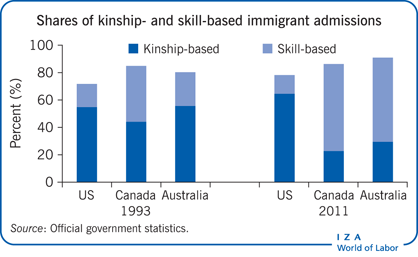Elevator pitch
Studies for major immigrant-receiving countries provide evidence on the comparative economic performance of immigrant classes (skill-, kinship-, and humanitarian-based). Developed countries are increasingly competing for high-skilled immigrants, who perform better in the labor market. However, there are serious challenges to their economic integration, which highlights a need for complementary immigration and integration policies.

Key findings
Pros
Skill-based selection of immigrants responds to the needs of the economy.
High-skilled immigrants have better labor market prospects in general than do immigrants admitted based on kinship ties or for humanitarian reasons.
High-skilled immigrants boost innovation, a key to long-term economic growth.
High-skilled immigrants in the labor market can raise wages for low-skilled native workers struggling with declining labor market prospects.
Highly paid skill-based immigrants may widen the tax base and help offset growing fiscal challenges.
Cons
The design of selection systems for skill-based admissions is complicated and requires frequent updating as the economic environment changes.
Skill-based immigrants face formidable economic integration challenges due to skill and credential transferability problems and underutilization of their human capital.
Identifying short-term skill shortages as a basis for admissions is difficult.
Allocating a higher share of immigrant admissions based on skills usually comes at the expense of kinship- and humanitarian-based admissions.